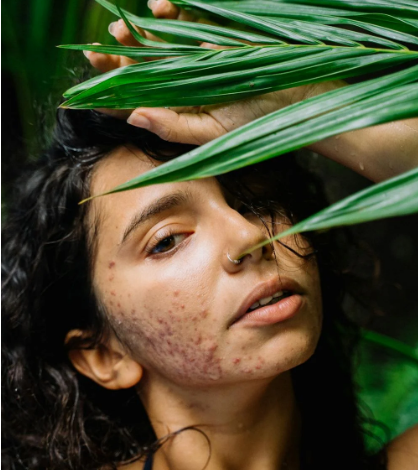
Skincare Routines for Different Skin Types: Customizing Your Regimen
Introduction
When it comes to skincare, a one-size-fits-all approach does not work for everyone. Each individual has a unique skin type with specific needs and concerns. Understanding your skin type is crucial in developing a skincare routine that caters to your specific requirements. In this article, we will explore skincare routines for different skin types, providing you with the knowledge to customize your regimen effectively.
Understanding Different Skin Types
Before diving into specific skincare routines, it’s essential to identify your skin type. The five primary skin types are normal, dry, oily, combination, and sensitive. Let’s take a closer look at each of these skin types and their characteristics.
Normal Skin
Normal skin is well-balanced and generally free from major concerns. It has a healthy complexion, moderate pore size, and is not excessively oily or dry. Those with normal skin can maintain their skin’s health by following a basic skincare routine consisting of cleansing, toning, moisturizing, and protecting from the sun.
Dry Skin
Dry skin lacks natural moisture and tends to feel tight, especially after cleansing. It may appear dull and flaky, and fine lines and wrinkles can be more noticeable. A skincare routine for dry skin should focus on hydrating and nourishing the skin. Gentle cleansers, rich moisturizers, and products containing hydrating ingredients like hyaluronic acid can help restore moisture balance.
Oily Skin
Oily skin is characterized by excess sebum production, leading to a shiny appearance and enlarged pores. Individuals with oily skin often experience acne breakouts and may struggle with maintaining makeup throughout the day. An effective skincare routine for oily skin involves deep cleansing, balancing the skin’s oil production, and using non-comedogenic products. Lightweight moisturizers and oil-absorbing ingredients like salicylic acid can be beneficial.
Combination Skin
Combination skin is a blend of different skin types, typically with an oily T-zone (forehead, nose, and chin) and drier cheeks. It requires a balanced approach to skincare. A suitable routine for combination skin includes gentle cleansing, toning, using oil-free moisturizers, and spot-treating areas with specific concerns. It’s important to address both oily and dry areas without overstripping the skin.
Sensitive Skin
Sensitive skin is prone to reactions and easily irritated by certain ingredients or environmental factors. It may experience redness, itchiness, or a burning sensation. A skincare routine for sensitive skin should prioritize gentle, fragrance-free products. Patch testing new products is crucial to avoid potential allergic reactions. Look for soothing ingredients like aloe vera and chamomile to calm and protect sensitive skin.
Creating a Customized Skincare Routine
Now that you have identified your skin type let’s explore how to customize your skincare routine accordingly.

- Cleansing
Start your skincare routine with a gentle cleanser suitable for your skin type. For normal skin, opt for a mild cleanser that removes impurities without stripping away natural oils. Dry skin benefits from a hydrating cleanser, whereas oily skin may require a foaming or gel-based cleanser to effectively remove excess oil. Combination skin can use a combination of gentle and oil-controlling cleansers. Sensitive skin requires a fragrance-free and hypoallergenic cleanser to minimize irritation.
- Toning
After cleansing, incorporate a toner into your routine. Toners help to balance the skin’s pH levels and remove any remaining traces of dirt or impurities. For normal skin, a gentle, alcohol-free toner is suitable. Dry skin can benefit from hydrating toners that contain ingredients like rose water or glycerin. Oily skin benefits from toners that contain ingredients like witch hazel to control excess oil production. Combination and sensitive skin types should opt for alcohol-free and soothing toners.
- Moisturizing
Moisturizing is a crucial step in any skincare routine. For normal skin, a lightweight moisturizer that provides hydration without feeling heavy is ideal. Dry skin requires a richer moisturizer that deeply nourishes and locks in moisture. Oily skin needs oil-free and non-comedogenic moisturizers that hydrate without clogging pores. Combination skin can use a combination of lightweight and targeted moisturizers for different areas. Sensitive skin benefits from gentle, fragrance-free moisturizers with soothing ingredients.
- Treating Specific Skin Concerns
In addition to the basic steps, it’s important to address any specific skin concerns you may have. Whether it’s acne, hyperpigmentation, fine lines, or other issues, there are targeted products available. Look for ingredients like salicylic acid or benzoyl peroxide for acne-prone skin, vitamin C or niacinamide for brightening, and retinol or peptides for anti-aging. Follow product instructions and introduce new treatments gradually to minimize any potential adverse reactions.
- Protecting Your Skin
Protection from the sun is essential for all skin types. Regardless of your skin type, it’s important to wear a broad-spectrum sunscreen with at least SPF 30 every day. Sunscreen helps prevent sunburn, premature aging, and reduces the risk of skin cancer. Choose lightweight, non-greasy formulas for everyday use and reapply as needed, especially when spending time outdoors.
Lifestyle Factors Affecting Skin
Apart from a skincare routine, certain lifestyle factors can impact the health of your skin. Here are some key considerations:
Diet: Consuming a balanced diet rich in fruits, vegetables, whole grains, and lean proteins can support overall skin health.
Hydration: Stay hydrated by drinking an adequate amount of water daily. Hydrated skin appears plump and radiant.
Sleep: Aim for quality sleep to allow your skin to regenerate and repair overnight.
Stress management: Chronic stress can contribute to skin issues. Practice stress management techniques like exercise, meditation, or engaging in hobbies to promote overall well-being.
Conclusion
Customizing your skincare routine according to your specific skin type is essential for achieving healthy, glowing skin. By understanding the characteristics of different skin types and tailoring your regimen accordingly, you can address specific concerns and promote overall skin health. Remember to be consistent, patient, and listen to your skin’s needs. Regularly reassess your routine and make adjustments as necessary to achieve the best results.
FAQs
Can I use the same skincare products for different seasons?
While some products may work year-round, it’s essential to adjust your skincare routine based on seasonal changes. During colder months, you may need heavier moisturizers, while lighter formulations may be suitable for warmer months.
Is it necessary to use all the steps mentioned in a skincare routine?
- The basic steps of cleansing, toning, moisturizing, and sun protection are essential for all skin types. However, you can adapt the routine based on your specific needs and concerns.
How often should Iexfoliate my skin?
- The frequency of exfoliation depends on your skin type and the type of exfoliator you use. Generally, 1-2 times a week is sufficient for most skin types. However, if you have sensitive skin, it’s best to exfoliate less frequently or choose a gentle exfoliating method.
Can I use natural ingredients as part of my skincare routine?
-
- Yes, natural ingredients can be incorporated into your skincare routine. Many natural ingredients have beneficial properties for the skin. However, it’s important to research and understand the specific properties and potential effects of each ingredient before use.
How long does it take to see results from a customized skincare routine?
-
- Results vary depending on individual factors and the specific concerns being addressed. Generally, it takes several weeks to notice significant improvements in the skin. Consistency and patience are key when following a skincare routine.
Can a skincare routine completely eliminate acne?
-
- While a customized skincare routine can significantly improve acne-prone skin, it may not completely eliminate acne for everyone. Severe or persistent acne may require additional treatments or professional intervention.
Remember, skincare routines should be tailored to your specific needs and preferences. If you have any concerns or specific skin conditions, it’s advisable to consult with a dermatologist or skincare professional for personalized advice and recommendations.


